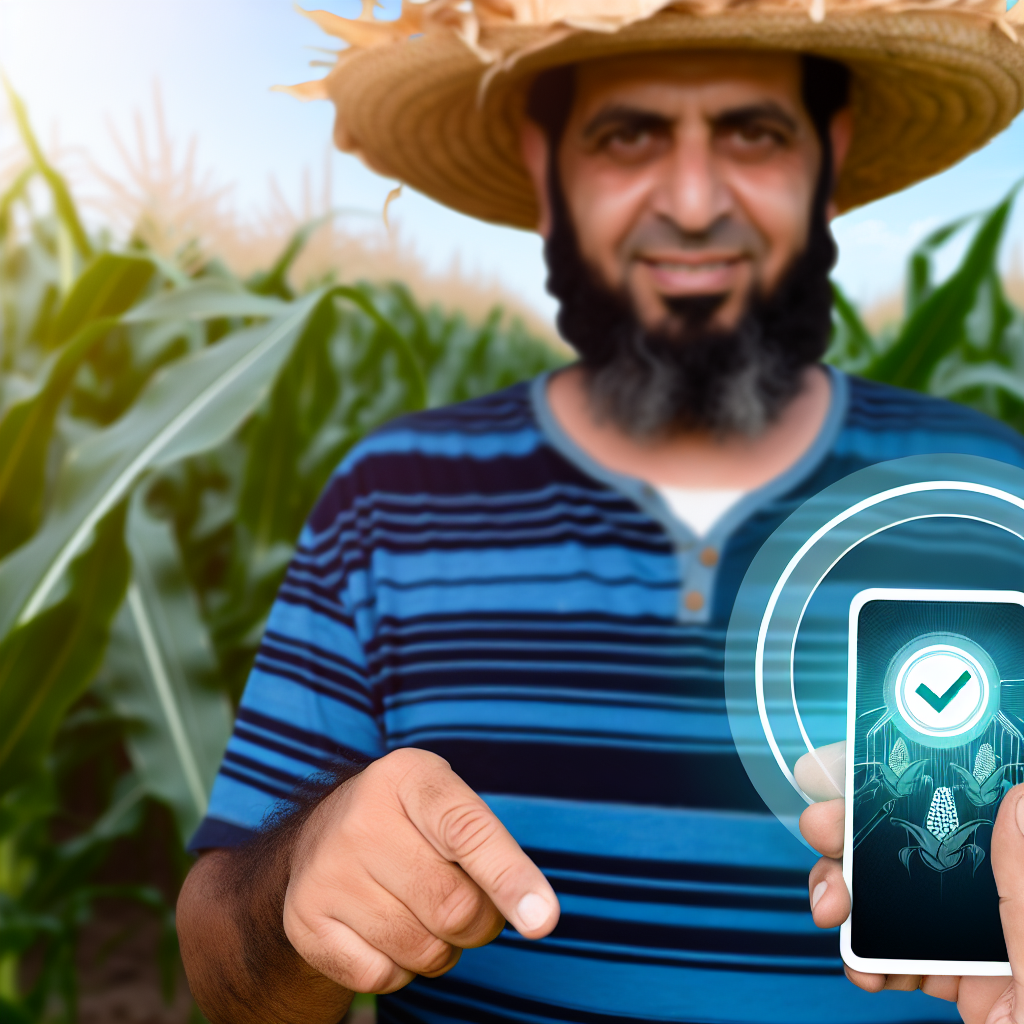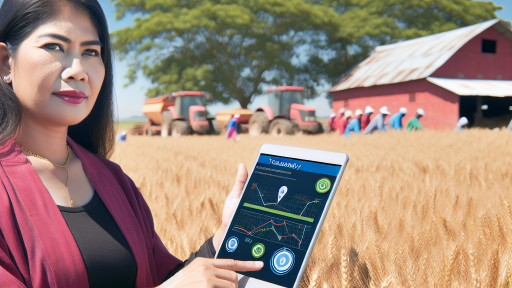Introduction to Agri-Fintech and Its Importance for Farmers
Agri-fintech merges agriculture and financial technology.
This approach transforms how farmers manage their finances.
Farmers face unique financial challenges in today’s economy.
Agri-fintech solutions provide essential tools for managing cash flow.
Moreover, these technologies facilitate access to credit and funding.
Farmers can use digital payment solutions to streamline transactions.
These innovations increase efficiency and reduce time spent on manual tasks.
Consequently, farmers can focus more on production and less on paperwork.
Key Features of Agri-Fintech Solutions
Agri-fintech solutions offer various features that cater to farmers’ needs.
Firstly, digital payment platforms simplify transactions between sellers and buyers.
Secondly, they enhance transparency in financial dealings.
Thirdly, these tools often include budgeting and forecasting functionalities.
Furthermore, they provide access to valuable market information.
Benefits of Digital Payment Solutions
Digital payment solutions bring numerous benefits to farmers.
They increase the speed of transactions, reducing waiting times.
Transform Your Agribusiness
Unlock your farm's potential with expert advice tailored to your needs. Get actionable steps that drive real results.
Get StartedThese solutions also minimize the risks associated with cash handling.
Additionally, they reduce transaction costs and improve record-keeping.
Farmers can also benefit from increased financial inclusion through these platforms.
Case Studies in Agri-Fintech
Several companies exemplify successful agri-fintech implementations.
AgroPay, for example, offers a mobile payment solution tailored for farmers.
Through its platform, farmers can receive payments instantly.
Another notable example is CropFunds, which connects farmers to investors.
This platform allows farmers to secure funding quickly and easily.
The Future of Agri-Fintech
The future of agri-fintech looks promising as technology advances.
We can expect more innovative solutions emerging to support farmers.
Artificial intelligence and machine learning will enhance service personalization.
Ultimately, agri-fintech aims to empower farmers for sustainable growth.
Overview of Digital Payment Solutions Available for Farmers
Introduction to Agri-Fintech
Agri-Fintech integrates technology and agriculture to streamline financial services.
This sector aims to enhance financial accessibility for farmers.
Digital payment solutions play a crucial role in achieving this goal.
Types of Digital Payment Solutions
Farmers can utilize various digital payment methods.
These include mobile wallets, online banking, and peer-to-peer payment platforms.
Each solution offers unique benefits for agricultural transactions.
Mobile Wallets
Mobile wallets provide convenience for farmers to make quick payments.
They allow easy access to funds from smartphones.
Popular options like Paytm and Google Pay cater specifically to rural users.
Online Banking
Online banking enhances the management of financial resources for farmers.
This system enables secure transfers and bill payments from anywhere.
Farmers appreciate the ability to monitor their financial activities closely.
Showcase Your Farming Business
Publish your professional farming services profile on our blog for a one-time fee of $200 and reach a dedicated audience of farmers and agribusiness owners.
Publish Your ProfilePeer-to-Peer Payment Platforms
Peer-to-peer platforms facilitate direct transactions between individuals.
These solutions reduce the need for cash handling.
Evenmo and Cash App are examples that simplify payments for services and goods.
The Role of E-Commerce Platforms
E-commerce platforms integrate digital payment systems for farmers.
They help farmers sell their products directly to consumers.
Examples like Agritask and Farmigo support seamless transactions.
Benefits of E-Commerce Solutions
Farmers benefit from wider market access through e-commerce.
These platforms often offer integrated payment processing options.
This combination helps streamline both sales and payments.
Challenges in Adoption
Despite the advantages, challenges exist in adopting digital payment solutions.
Many farmers face issues like limited internet access in rural areas.
Additionally, there is a lack of awareness about these technologies.
Addressing Technological Barriers
Organizations are working to improve rural internet connectivity.
Educational initiatives are essential to promote digital literacy among farmers.
These efforts aim to empower farmers to utilize these solutions effectively.
The Future of Digital Payments in Agriculture
The future holds promise for more advanced digital payment systems.
Innovations such as blockchain could enhance security in transactions.
Moreover, data analytics will provide insights for better decision-making.
Implications for Farmers’ Financial Efficiency
Digital payment solutions will keep evolving in the agricultural sector.
By embracing these changes, farmers can improve their financial efficiency.
This progress will ultimately support sustainable agricultural practices.
Benefits of Digital Payments in Agriculture
Streamlined Transactions
Digital payment systems simplify transactions between farmers and buyers.
Farmers can receive payments instantly for their goods.
This process reduces the need for cash exchanges.
Furthermore, it minimizes the risk of theft associated with cash handling.
Improved Cash Flow Management
Digital payments enhance financial tracking for farmers.
Farmers gain better visibility over their cash flow and spending.
This visibility allows for informed budgeting and investment decisions.
Additionally, it helps in planning for future agricultural needs.
Access to Financial Services
Digital payment solutions often connect farmers to financial institutions.
Farmers can access credit and loans more easily.
This access enables them to fund expansions and improvements.
Moreover, it fosters a relationship with banks and financial advisors.
Efficiency and Convenience
Farmers can make payments remotely via smartphones or computers.
This convenience saves time compared to traditional payment methods.
Moreover, it allows farmers to focus on their core agricultural activities.
Digital platforms often operate 24/7, providing flexibility.
Enhanced Transparency and Accountability
Digital transactions create an electronic record of payments.
This transparency aids in resolving disputes efficiently.
Furthermore, it helps in maintaining accurate financial records for auditing purposes.
Showcase Your Farming Business
Publish your professional farming services profile on our blog for a one-time fee of $200 and reach a dedicated audience of farmers and agribusiness owners.
Publish Your ProfileSuch accountability builds trust between farmers and buyers.
Encouragement of Better Practices
Digital payments incentivize good agricultural practices.
Farmers who adopt these practices receive quicker payments.
Additionally, it promotes adherence to quality standards.
This behavior benefits end consumers and boosts the market reputation of farmers.
Find Out More: Revolutionizing Farming With Innovative Crop Disease Detection Technologies
Comparison of Traditional vs. Digital Payment Methods
Understanding Traditional Payment Methods
Traditional payment methods include cash and checks.
Farmers often prefer cash due to its immediacy.
Checks provide a written record of transactions.
However, checks can take time to clear.
Additionally, many rural areas lack banking facilities.
Limitations of Traditional Payments
Cash transactions can be difficult to track.
They also carry risks of theft or loss.
Checks may bounce, leading to additional fees.
Consequently, traditional methods can hinder cash flow.
Farmers often face delays in receiving funds.
Overview of Digital Payment Methods
Digital payment solutions are gaining popularity.
Apps and online platforms simplify transactions.
Farmers can receive payments instantly through these methods.
Furthermore, they can access records easily for accounting purposes.
Advantages of Digital Payments
Digital payments enhance security for farmers.
Transactions are encrypted to protect sensitive information.
Additionally, they reduce the risks associated with cash handling.
Farmers can manage payments seamlessly from mobile devices.
This accessibility promotes efficiency in operations.
Challenges of Digital Payment Solutions
Unfortunately, not all farmers are tech-savvy.
Some may struggle to adopt digital tools.
Additionally, internet connectivity can be an issue.
Rural areas may lack reliable broadband access.
Hence, digital payments may not be universally feasible.
Comparing Costs of Payment Methods
Transaction fees can vary between methods.
Cash transactions typically have no cost.
However, checks may incur bank fees.
Conversely, digital transactions often include processing fees.
Farmers should evaluate costs before choosing a method.
Future Trends in Agri-Fintech Payments
Digital payment solutions are evolving rapidly.
Innovations could further streamline processes.
For example, blockchain technology may enhance security.
Farmers might also benefit from real-time payment solutions.
Ultimately, staying informed will help them adapt.
Showcase Your Farming Business
Publish your professional farming services profile on our blog for a one-time fee of $200 and reach a dedicated audience of farmers and agribusiness owners.
Publish Your ProfileDiscover More: Biomass Digesters for Renewable Farm Energy Production
Key Players in the Agri-Fintech Space: Who’s Leading the Way?
Overview of Agri-Fintech Companies
The Agri-Fintech sector is growing rapidly worldwide.
Several companies are at the forefront of this innovation.
These players focus on integrating technology with agriculture.
Ultimately, they aim to streamline financial solutions for farmers.
Notable Agri-Fintech Leaders
Various companies are making significant contributions to the Agri-Fintech space.
- Farmers Edge is a notable player with cutting-edge data analytics.
- GramCover offers insurance solutions tailored for farmers.
- Agrivi provides farm management software to optimize operations.
- Kiva helps with microloans specifically for agricultural projects.
Each company has its unique strengths and target markets.
Innovative Payment Solutions
Digital payment solutions are critical for transforming agricultural finance.
Companies like Paytm and Razorpay facilitate seamless transactions.
Farmers can directly access funds through mobile platforms.
These solutions enhance financial inclusion for the agricultural community.
Emerging Startups in Agri-Fintech
Startups are also crucial in driving Agri-Fintech innovation.
For instance, Agri-wallet combines a digital wallet with agricultural services.
Another example is Reap, which focuses on easing supply chain finance.
These startups leverage technology to empower local farmers.
Collaborations and Partnerships
Partnerships play a key role in enhancing Agri-Fintech solutions.
Collaboration between tech companies and agricultural cooperatives is common.
For example, Syngenta partners with various fintech companies.
This approach amplifies the reach and impact of financial services.
See Related Content: Improving Soil Health With Agricultural Biotechnology

Challenges Farmers Face in Adopting Digital Payment Solutions
Technological Barriers
Many farmers lack access to reliable internet connectivity.
This limitation restricts their ability to use digital payment systems.
Moreover, inadequate technological infrastructure complicates the adoption process.
Farmers may also struggle with outdated devices that cannot support modern apps.
Financial Literacy
Digital payment solutions require some degree of financial literacy.
Unfortunately, many farmers have limited knowledge of digital finance tools.
This gap can lead to improper usage and mistrust of the systems.
Efforts to educate farmers are crucial for overcoming these challenges.
Cost Considerations
Initial setup and transaction fees can deter farmers from adopting digital payments.
Some may perceive these costs as burdensome on already tight budgets.
Additionally, hidden fees can create distrust around the payment systems.
Transparent pricing models are essential to build confidence among farmers.
Security Concerns
Farmers often worry about the safety of their financial information.
Cybersecurity threats loom large in the digital landscape.
Consequently, many remain hesitant to transition from cash transactions.
Increased awareness and robust security measures can alleviate these fears.
Regulatory Issues
Varying regulations across regions can complicate digital payment adoption.
Compliance with local laws may prove difficult for farmers.
Moreover, regulatory uncertainties can create additional barriers to entry.
A collaborative approach between farmers and regulators may foster smoother transitions.
Showcase Your Farming Business
Publish your professional farming services profile on our blog for a one-time fee of $200 and reach a dedicated audience of farmers and agribusiness owners.
Publish Your ProfileCultural Resistance
Traditional farming communities may resist change due to cultural norms.
Cash transactions have been the norm for many generations.
This resistance can hinder the willingness to adopt new technology.
Community engagement and demonstrable benefits can help shift attitudes.
Gain More Insights: Smart Contracts And Blockchain Transforming Farming Agreements
Case Studies: Successful Implementation of Digital Payments in Farming
Introduction to Digital Payment Solutions
Digital payment solutions revolutionize agricultural transactions.
Farmers can now manage their finances with increased efficiency.
These technologies bridge gaps between producers and consumers.
Case Study: AgroPay in Kenya
AgroPay launched as a mobile payment platform for farmers in Kenya.
It allows transactions through mobile wallets and SMS services.
This solution increased the speed of payments across the supply chain.
Farmers reported higher satisfaction as transactions became hassle-free.
Moreover, AgroPay integrates with local banks, enhancing credibility.
Impact on Smallholder Farmers
Smallholder farmers experienced greater financial inclusion.
They could access credit through digital transaction histories.
This visibility encouraged lenders to support their operations.
Case Study: GrainChain in Latin America
GrainChain addresses payment issues in grain trading across Latin America.
This platform offers blockchain solutions for transparent transactions.
It ensures trust among farmers, traders, and buyers.
Additionally, it facilitates quick payment settlements.
Technology and Traceability
Blockchain enhances traceability in agricultural supply chains.
Farmers can track their produce from field to market.
This transparency reassures consumers about product origins.
Case Study: Tandoor in India
Tandoor launched a platform for farmers in India to receive payments digitally.
It connects farmers with buyers directly, minimizing middlemen.
This approach improves profit margins for farmers significantly.
Moreover, digital transactions reduce the cash handling burden.
Challenges Faced and Solutions
Some farmers faced challenges in adopting digital solutions.
Training sessions and support increased user adoption rates.
Additionally, partnerships with local co-operatives promoted awareness.
Case Study: PayAgri in Nigeria
PayAgri provides a payment solution tailored for Nigerian farmers.
It combines traditional cash payments with modern mobile transactions.
Farmers can manage their finances in an environment they trust.
This flexibility has made agriculture more sustainable in the region.
Results Achieved by PayAgri
The platform has successfully onboarded thousands of farmers.
Increased access to financial services led to higher yields.
Farmers report improved livelihoods and business growth.
Implications of Digital Payments for Agriculture
The case studies highlight the potential of digital payment solutions.
They showcase improved financial management for farmers worldwide.
Ultimately, these solutions contribute to sustainable agriculture development.
Showcase Your Farming Business
Publish your professional farming services profile on our blog for a one-time fee of $200 and reach a dedicated audience of farmers and agribusiness owners.
Publish Your ProfileFuture Trends in Agri-Fintech and Digital Payments for Farmers
Integration of Blockchain Technology
Blockchain technology is revolutionizing agri-fintech applications.
It enhances transparency and traceability in transactions.
Farmers can verify the authenticity of their products effortlessly.
Moreover, smart contracts automate payment processes effectively.
This technology minimizes disputes and increases trust among stakeholders.
Rise of Mobile Payment Solutions
Mobile payment solutions are gaining traction among farmers.
Smartphones provide easy access to financial services.
Farmers can conduct transactions from remote locations instantly.
This increased accessibility fosters financial inclusion.
Additionally, mobile payments reduce reliance on cash transactions.
Enhanced Financial Literacy Programs
Educational initiatives are crucial for farmer empowerment.
They improve understanding of financial tools and digital payments.
Furthermore, tailored workshops can address specific farmer needs.
Informed farmers make better financial decisions.
This knowledge ultimately boosts agricultural productivity.
Partnerships with Fintech Startups
Traditional banks are increasingly collaborating with fintech startups.
These partnerships drive innovation in agricultural finance.
Startups bring nimble and tech-driven solutions to the market.
Consequently, farmers benefit from customized financial products.
Such collaborations expand access to capital for farm operations.
Data-Driven Insights for Decision Making
Data analytics tools provide crucial insights for farmers.
These tools help analyze market trends and pricing strategies.
Farmers can make informed decisions based on accurate data.
Predictive analytics allows for smarter resource allocation.
Ultimately, data-driven approaches enhance successful farming outcomes.
Additional Resources
CropX Agronomic Farm Management System
FinTech Solutions Supporting Sustainable Agriculture ? Lessons …




